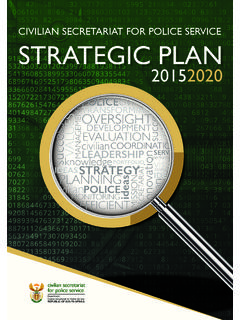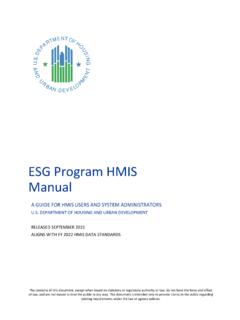Transcription of COMMUNITY SAFETY FORUMS POLICY
1 CIVILIAN SECRETARIAT FOR POLICE COMMUNITY SAFETY FORUMS POLICY 2 GLOSSARY OF TERMS ADR Alternative Dispute Resolution BAC Business Against Crime CBO COMMUNITY -based Organisations CJS Criminal Justice System COGTA - Department of Co-operative Governance and Traditional Affairs CPF COMMUNITY Police Forum CSA COMMUNITY SAFETY Audit CSF COMMUNITY SAFETY FORUMS CSP - COMMUNITY SAFETY Plan DCS Department of Correctional Services Dev Com Integrated Justice System Development Committee DHA Department of Home Affairs DM District Municipality DoJCD Department of Justice and Constitutional Development DSD Department of Social Development IDASA Institute for Democracy in South Africa IDP Integrated Development Planning process IDP s Integrated Development Plans IGR Inter-government Relations IJS Integrated Justice System JCPS Justice, Crime Prevention and Security Cluster JOINTS Joint Operations and Intelligence Structures LCPS Local Crime Prevention Strategy and Plan 3 LM - Local Municipality MinMec Ministers and Members of Executive Councils MTBPS - Medium Term Budget POLICY Strategy MTEF - Medium Term Expenditure Framework NGO Non-Governmental Organisations NCPS National Crime Prevention Strategy NPA National Prosecuting Authority SAPS South African Police Service SGB - School Governing Body WPSS White Paper on SAFETY and Security 4 CIVILIAN SECRETARIAT FOR POLICE POLICY FOR ESTABLISHMENT OF COMMUNITY SAFETY FORUMS 1.
2 INTRODUCTION COMMUNITY SAFETY FORUMS emanated from the requirements outlined in the National Crime Prevention Strategy (NCPS) of 1996, and the 1998 White Paper on SAFETY and Security. Both sought to improve, amongst others, the functioning of the criminal justice system (and in particular the police) in the local domain and to enhance crime prevention activities. Whilst the NCPS and the White Paper created the opportunity for integrated approaches to preventing crime and increasing the efficiency of law enforcement, it failed to articulate around the methodology and structural arrangements as to exactly how the CSF concept must be implemented. CSFs are based on the premise that increased co-operation and interaction would improve the functioning and deliberations within the local criminal justice system and the delivery of crime prevention projects.
3 This resulted in the CSF concept evolving as a replicable structure for integrated problem solving at local level destined to provide means for sharing information and coordinating an inter-disciplinary approach to crime prevention. This approach is inclusive of collaboration and responses from all the departments in the Justice, Crime Prevention and Security (JCPS) cluster and other relevant organs of state. The COMMUNITY SAFETY Forum does not aim to replace or duplicate any existing structure or forum at local level. It will solely serve as a coordinating structure for collaboration and integrated planning and implementation at local government level. Therefore, the main intention remains the replication of the co-ordination and monitoring functions of the JCPS (or criminal justice system) structure to streamline and enhance integrated planning at local government level.
4 Since the CSF concept is closely related to COMMUNITY Policing, a clear distinction needs to be drawn. COMMUNITY SAFETY FORUMS (CSF s) are meant to facilitate the delivery of a multi-sectoral governmental approach on SAFETY in local communities and is distinguished from the CPF through its jurisdiction and tasks. The CPF is a legal COMMUNITY structure established in terms of the South African Police Service (SAPS) Act and is mandated to facilitate COMMUNITY police relations within a specific police station precinct (police station boundary) and serves as the mouthpiece of the COMMUNITY with the police and vice versa on policing matters and other relevant SAFETY issues. Members of this forum are elected during formal election processes and get its mandate from the COMMUNITY to execute the legal powers and functions.
5 The jurisdiction of a CSF is aligned to the municipal and/or district municipal jurisdiction/boundary. Once formalized and established, it will facilitate and enhance co-operation, integrated planning and coordinate implementation of SAFETY programmes and projects in the local sphere. It will consist of representatives formally nominated and endorsed by the respective department, institution or COMMUNITY based organisation. In this regard, the CPF will be but one of the stakeholders represented in the CSF structure. By taking over the co-ordination 5 of crime prevention activities, COMMUNITY SAFETY FORUMS could allow COMMUNITY policing to focus exclusively on police- COMMUNITY issues and report on successes, projects and challenges.
6 As such, they could serve as the major conduit for COMMUNITY participation in COMMUNITY SAFETY FORUMS . The FORUMS could also assist CPFs to access government resources that would previously have been beyond their reach. Therefore, CSFs are meant to harness the energies of JCPS departments and relevant organs of state with a view to realizing synergies and better coordination. Some of the important principles that inform service delivery in government include the following: Integrated service delivery Multi-agency collaboration Joint planning of operations Strong COMMUNITY participation and consultation A commitment to sharing of resources COMMUNITY engagement and accountability Responsiveness Openness and transparency The context for the development of a POLICY framework for CSFs stems from a Cabinet instruction to the Department of Police, through the JCPS cluster to facilitate and expedite the establishment of CSFs throughout the country.
7 Research towards the POLICY included an audit conducted during 2010 which revealed that a number of CSFs have been established and is in existence in some of the provinces in the country. However, the organisational designs and responsibilities of existing CSFs differ from area to area. This POLICY framework aims to respond to these challenges by proposing a uniform POLICY approach to the establishment of CSFs. 2. THE MANDATE FROM GOVERNMENT Currently, the South African government s strategic objective for the JCPS cluster is that All People in South Africa Are and Feel Safe . The Constitution bestows the right on all South African citizens to enjoy an accountable, effective and a service-oriented Criminal Justice System (CJS). It directs the state to provide all citizens and those within the country s boundaries with adequate security from those who perpetrate crime.
8 Various initiatives have been undertaken by the democratic government since 1994, in addressing crime, and to ensure that the CJS is transformed. Government has shifted its focus from operating in silos within departments to a holistic and collaborative approach amongst the various stakeholders, through the clustering system. There are various structures that have been established on national, provincial and local spheres of government that consist of various CJS departments. The main focus of these structures is to provide strategic direction on 6 implementing government POLICY in a collaborative manner. Some of these JCPS cluster structures include the National and Provincial Development Committees and Joint Operations and Intelligence Structures (JOINTS).
9 The mandate from government is then to formulate a POLICY that will see the development of CSFs in all parts of the country in order to give effect to the imperative of working in a cohesive and integrated manner. 3. THE NEED FOR COMMUNITY SAFETY FORUMS CSFs is designed to serve as a platform for coordination, integration and monitoring the implementation of multi-sectoral crime prevention- and COMMUNITY SAFETY initiatives within the context of the National (and Provincial) JCPS priorities in serving as the central catalyst for joint collaboration towards a local crime prevention strategy. As such, the CSF concept also emphasises the need to ensure synergy and alignment of all government inputs and outputs in the local domain to fast track and improve service delivery whilst drawing on all available resources in achieving the commitments underlying the developmental perspective.
10 Such deliberations must be undertaken within the guiding framework of the intergovernmental relations prescripts and co-operative government. 4. CONSTITUTIONAL AND LEGISLATIVE FRAMEWORK Set out below is a synopsis of the constitutional and legislative imperatives that should guide the POLICY framework for planning, coordination and execution of integrated crime prevention initiatives. The Constitution of the Republic of South Africa1996 Section 40 of the Constitution states that government is constituted in the national, provincial and local spheres and that spheres are distinctive, interdependent and interrelated. Section 41 of the Constitution goes on to state that all spheres of government and all organs of state within each sphere must preserve the peace, secure the well-being of the people of the Republic; co-operate with one another in mutual trust and good faith by, inter alia, assisting and supporting one another and coordinating their actions and legislation with one another.
















